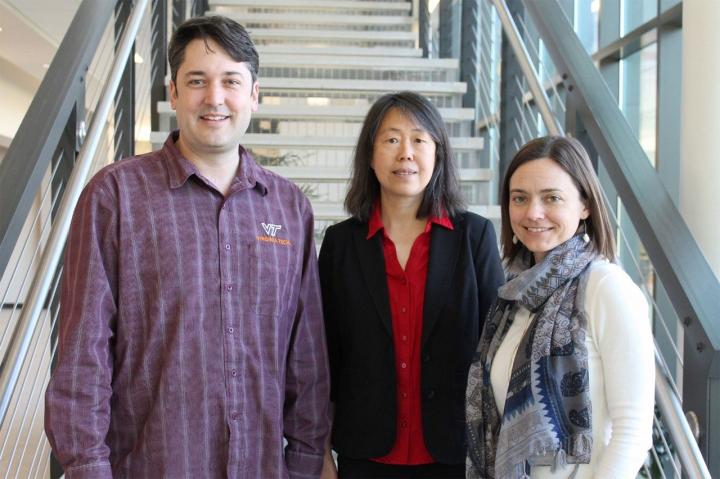
IMAGE: From left: Virginia Tech researchers Roger Schürch, Kang Xia, Cassidy Rist, and Douglas Pfeiffer (not pictured) were awarded a $1.4 million grant to undertake the economic and environmental impact assessments… view more
Credit: Virginia Tech
Malaria, according to the U.S. Agency for International Development, continues to be a leading cause of illness and death worldwide. Despite extensive work that has produced widespread improvements in fighting the spread of the disease, global efforts have hit a plateau, underscoring the need for innovative thinking and new tools that complement those currently in use.
In this context, a multidisciplinary team of Virginia Tech researchers has been awarded a $1.4 million grant from Unitaid to undertake the economic and environmental impact assessments for BOHEMIA (Broad One Health Endectocide-based Malaria Intervention in Africa), a four-year project that will conduct two clinical trials in different eco-epidemiological settings in eastern and southern Africa: Tanzania and Mozambique.
For two consecutive years, ivermectin will be distributed in mass drug administration (MDA) campaigns to humans and livestock in order to kill the mosquitoes that transmit malaria, an effort that ultimately seeks to reduce the disease’s transmission.
Leading the grant’s economic impact assessment is principal investigator Cassidy Rist, an assistant professor in the Department of Population Health Sciences in the Virginia-Maryland College of Veterinary Medicine.
Concurrently, Kang Xia, a professor of environmental chemistry in the Virginia Tech College of Agriculture and Life Sciences’ School of Plant and Environmental Sciences, is overseeing the grant’s environmental impact assessment. Working with Xia are entomology professors Douglas Pfeiffer and Roger Schürch, also in the College of Agriculture and Life Sciences.
“We plan to take a One Health approach to ensure that the impact of ivermectin MDA across human, animal, and environmental health sectors is adequately captured and used to supplement the primary efficacy and safety outcomes of the trial in policy and wider implementation development,” said Rist.
Ivermectin has long been used by veterinarians across the globe to improve animal health; however, the medication’s use in livestock for the purpose of reducing mosquito populations that transmit a disease affecting only humans is a truly novel concept.
“The trial offers a unique opportunity to evaluate the potential indirect economic benefits associated with improved human and livestock productivity, in addition to the commonly used metric of cost per case of malaria averted,” noted Rist, who is working with two former Virginia Tech faculty members, Achla Marathe and Bryan Lewis, now at the University of Virginia.
Study of the environmental impact of the MDA of ivermectin to humans and livestock will be incorporated by way of Xia’s leadership in determining the fate and impact of the excreted ivermectin and its metabolites in the local soil and aquatic environment, an issue that has very limited evidence in the tropics where the trial will take place.
“As an environmental scientist, I think it is wonderful to see that medical doctors, veterinarians, economists, and policymakers have begun to value the importance of environmental impact in the overall assessment of and decisions for improving human health. This kind of One Health approach will help us avoid repeating, for example, the dire environmental consequences that resulted from the widespread use of DDT in the 1950s. From this perspective, the project is genuinely forward-looking,” said Xia.
At the conclusion of their work, Rist and Xia believe that their approach will provide a more detailed, One Health-based understanding of the full costs and benefits associated with ivermectin MDA in humans and livestock.
“It is a great honor to be part of such an ambitious project that recognizes and values the importance of quantifying system-level, One Health impacts of such a promising intervention,” Rist said. “We look forward to working in collaboration with our exceptional partner institutions across the globe.”
The Virginia Tech grant is part of a $25.3 million grant awarded by Unitaid (a Geneva-based global health initiative that works to end epidemics) to the Barcelona Institute for Global Health, ISGlobal, which is heading a consortium that includes Virginia Tech, the Centro de Investigação em Saúde de Manhiça, the Ifakara Health Institute, the University Hospital Bern, and the University of Oxford.
###
Disclaimer: AAAS and EurekAlert! are not responsible for the accuracy of news releases posted to EurekAlert! by contributing institutions or for the use of any information through the EurekAlert system.

